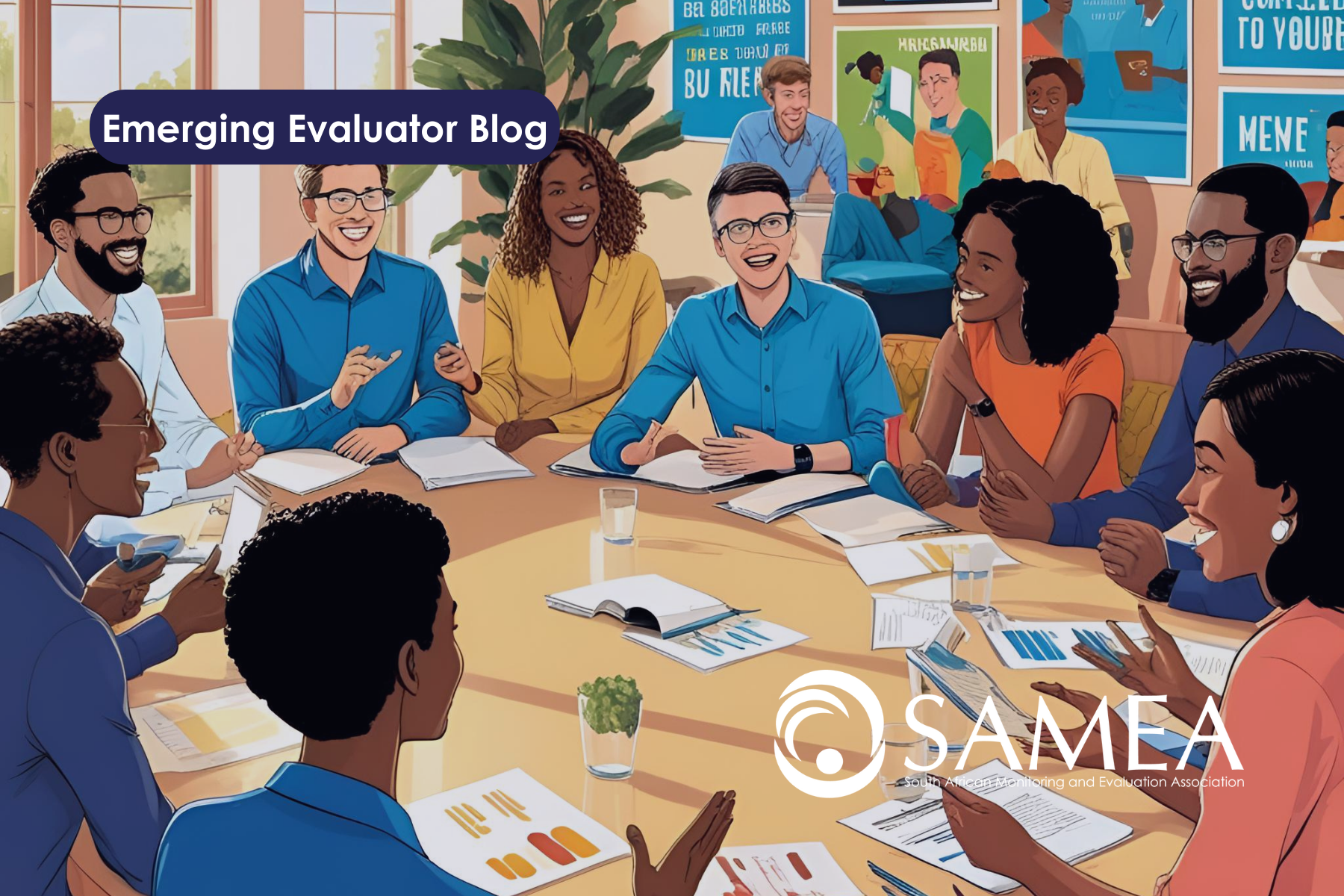Empowering Emerging Evaluators: Insights and Practical Recommendations for Programme Evaluations

Blog by Lisebo Ts’ehlana – Emerging Evaluator at SAMEA (2024)
This article was inspired by the Emerging Evaluators sessions at the SAMEA 9th Biennial Conference 2024.
The conference highlighted the growing demand for skilled evaluators and the importance of empowering Emerging Evaluators (EEs) to foster a sustainable, innovative evaluation workforce. This blog explores key themes, lessons, and practical recommendations shared during these sessions.
Emerging Evaluators
Emerging evaluators are individuals new to the field who are developing their skills and competencies (Lavelle et al., 2023). Evaluator education—formal and experiential—plays a critical role in preparing them for the evolving evaluation landscape.
Empowering Emerging Evaluators in Evaluation Project Phases
Empowering EEs requires:
-
Professional development
-
Experiential learning
-
Structured mentorship
Collaborative Approaches in Evaluation (CAE) offer a participatory methodology that ensures shared ownership, relevance, ethical integrity, and context-grounded findings (Shulha et al., 2015).
As M&E becomes central to evidence-based decision-making, EEs’ fresh perspectives and innovative approaches can greatly enrich evaluations—if systemic challenges such as limited mentorship and peripheral roles are addressed.
The Roles and Contributions of Emerging Evaluators
EEs bring:
-
Innovation and fresh perspectives
-
Creative methodologies
However, they often face tokenism, relegated to minor roles (e.g., data collection) without meaningful decision-making influence.
Insights from Youth Voices in Evaluations
Several key insights emerged:
Hart’s Ladder of Participation
This framework illustrates the progression from tokenistic involvement to genuine youth leadership in evaluations.
Eval4Action Standards
These standards prioritise youth-led leadership, capacity building, and knowledge management to foster meaningful engagement.
Draft Guidelines for Involving Youth and Emerging Evaluators
Sessions stressed the need for:
-
Structured training
-
Organisational readiness
-
Stronger mentorship programmes
-
Context-specific participation frameworks
Lessons from Including Young People in Evaluation Processes
Youth-led evaluations, such as the Children’s Parliament Programme in Zimbabwe and the Phakamani Young Minds Academy, demonstrated that:
-
Youth collaboration enhances evaluation relevance and quality
-
Mentorship and structured leadership opportunities strengthen young evaluators’ skills
Participatory methods like confidential voting and storytelling foster inclusive, candid contributions.
Challenges Encountered by Emerging Evaluators
Key barriers include:
-
Limited decision-making power and tokenism
-
Lack of structured mentorship and support
-
Gap between academic knowledge and practical skills
-
Limited access to practical evaluation opportunities
-
Hierarchical work environments that undervalue youth perspectives
-
Unclear career progression pathways
-
Financial constraints and limited institutional support
-
Challenges in stakeholder engagement
-
Ethical dilemmas without adequate guidance
These challenges highlight systemic issues that hinder meaningful youth inclusion.
Recommendations for the Evaluation Field
Establish Structured Mentorship and Coaching Programmes
-
Pair EEs with senior evaluators
-
Encourage peer mentoring
-
Provide guidance on career development and ethics
Create More Entry-Level Opportunities and Paid Internships
-
Offer fairly paid internships
-
Reduce unrealistic experience requirements
Promote Meaningful Participation of EEs in Evaluations
-
Involve EEs in design, analysis, and reporting
-
Provide platforms for EEs to present findings
Strengthen Practical Training and Skills Development
-
Integrate hands-on training into academic curricula
-
Offer simulations, workshops, and fieldwork experience
Develop Clear Career Progression Pathways
-
Define competency-based career ladders
-
Support accreditation and certification schemes
Address Power Imbalances and Promote Inclusive Leadership
-
Foster environments where EEs contribute meaningfully
-
Advocate for participatory evaluation models
Increase Funding and Institutional Support
-
Allocate resources to EE-focused programmes
-
Fund scholarships and professional development opportunities
Conclusion
The SAMEA 9th Biennial Conference reaffirmed the critical role of Emerging Evaluators in strengthening the evaluation field.
However, unlocking their full potential requires:
-
Deliberate mentorship and inclusion strategies
-
Systemic reforms to address tokenism and hierarchical barriers
-
Clear professional pathways and institutional investment
By investing in EEs, the evaluation profession can ensure greater innovation, diversity, and sustainability. A truly inclusive and contextually grounded M&E field depends on nurturing the next generation of evaluators.
References
-
Lavelle, J. M., Neubauer, L. C., Boyce, A. S., & Archibald, T. (2023). Setting the Stage for Critically Defined and Responsive Evaluator Education and Training.
-
Matlala, L. S. (2024). Empowering Emerging Evaluators in Evaluation Project Phases: Perspectives and Recommendations.
-
Shulha, L. M., et al. (2015). Introducing Evidence-Based Principles to Guide Collaborative Approaches to Evaluation.
-
YouthPower: Roger Hart’s Ladder of Participation [online].
-
Eval4Action: Leveraging the Power of Youth in Evaluation.
Most Recent Read
Discover more topics
